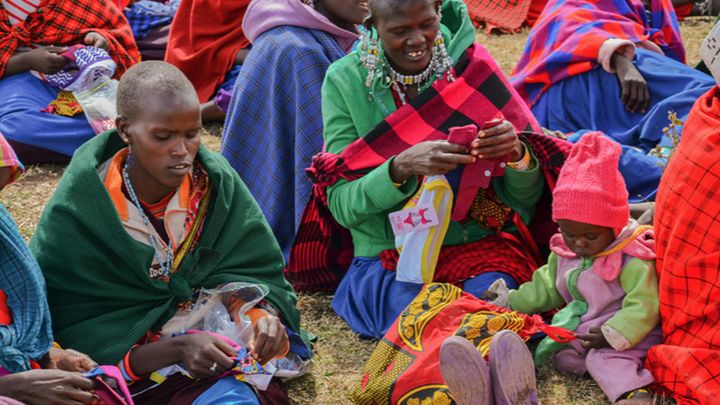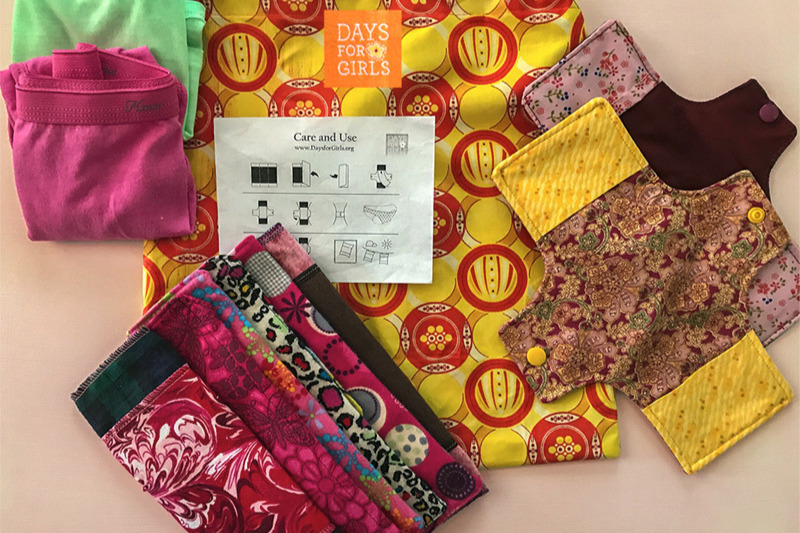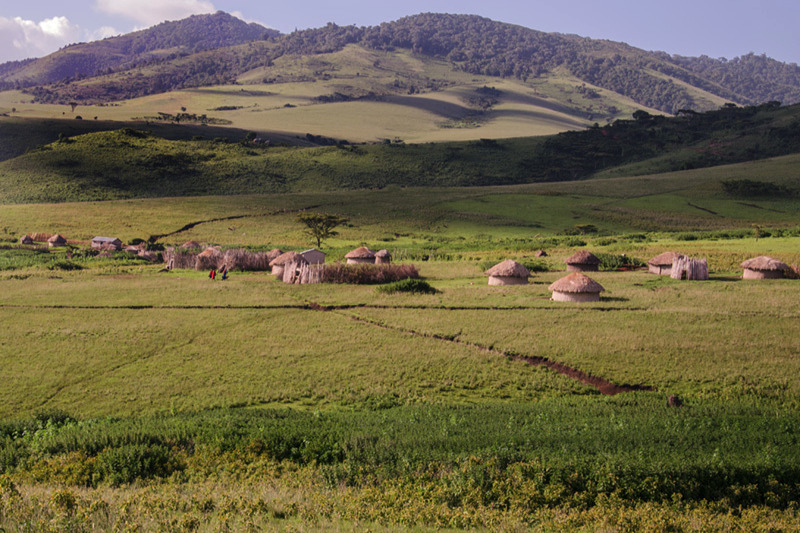
Endulen Maasai Women's Health Project 2019
Our 2020 project for the Endulen Maasai Women's Health Project is now called the TemboHeart Project for Girls and Women in Tanzania.
Please donate here: https://www.gofundme.com/temboheart
Dear Donors,
I hope this finds you all well and safe during this unprecedented time. I wanted to let you know that in spite of everything going on in the world, I’ve started a new fundraiser to continue providing sustainable menstrual hygiene solutions and vital health education to girls and women in Tanzania. For this year, we hope to expand our project and help girls at primary schools in Arusha and Endulen. We will continue to meet with the Endulen village women.
Starting a new fundraiser during a pandemic seems almost too hopeful, yet that is what my heart is telling me to do; I believe we all need to know that what is dear to us can go on. While many people can stay home and order essentials online, the girls and women I’ve met at our meetings in Tanzania have no nearby shops, little or no money and no street address or internet access. They still need our help because, as I read on the Days for Girls site, “Periods don’t stop for pandemics.”
I’ve also expanded the project with a new name — TemboHeart — and an Etsy shop to help with donations. Tembo is the Swahili word for elephant and these intelligent, family-oriented mammals are literally bighearted — the average elephant heart weights 26-46 pounds (12-21 kg). I admire the elephant’s matriarchal society and the way they care for each other. For me, TemboHeart means taking care of our world community and each other, however close or far away.
When you support projects that create positive social change in the world, your bigheartedness can directly impact the direction of someone’s life. Thank you so much for all your bigheartedness!
• TemboHeart Project for Girls and Women in Tanzania is now live at https://www.gofundme.com/temboheart
• Etsy shop (still added new jewelry listings): https://www.etsy.com/shop/TemboHeartDesigns
• View my Africa images portfolio on Instagram at https://www.instagram.com/lynnmarlowe/
Note: Three donations I received on the 2019 site for this year have been transferred to the new fundraiser. Thank you!
••••••
When girls and women have access to a safe, reliable method for managing their periods and health education to understand their bodies, menstruation can be seen as a healthy, natural part of growing into womanhood — not a change that means dropping out of school and being forced to marry too young or missing work and struggling to care for a family.  [Above]: Better sanitary care and reproductive health education for school girls improves attendance.
[Above]: Better sanitary care and reproductive health education for school girls improves attendance. [Above]: Menstrual hygiene management is deeply connected to a sense of dignity.
[Above]: Menstrual hygiene management is deeply connected to a sense of dignity. [Above]: Fewer than one in 100 Maasai girls complete high school.
[Above]: Fewer than one in 100 Maasai girls complete high school.
[Below]: Dr. Mameso Frederick demonstrates how to assemble the reusable pads, shields and panties.
After our 2017 kit distribution at a secondary school in Endulen, the Advanced Level Matron, Ms. Irene Mlay, wrote to me that “this school is in a remote place, most girls are from peasant families, especially Maasai, and for them education, especially to girls, is not important. In recent years, we can see them at least responding positively to education after some family members have been educated [through] government efforts, law enforcement and sponsorship from charitable people and organizations. Otherwise girls are very early forced to be married, and they are traditionally raised with that mentality. Girls from families with problems are hardly even able to get their social demands met.” [Above]: Ms. Irene Mlay and Lemali Sabore at our 2017 meeting at Embarway Secondary School. "You care for our girls," Ms. Mlay wrote to me. "It will never be worthless work. You are doing something hard for them to simply forget. Thank you on their behalf. [The kits are] to them more meaningful help than one can say.”
[Above]: Ms. Irene Mlay and Lemali Sabore at our 2017 meeting at Embarway Secondary School. "You care for our girls," Ms. Mlay wrote to me. "It will never be worthless work. You are doing something hard for them to simply forget. Thank you on their behalf. [The kits are] to them more meaningful help than one can say.” [Above]: The link between access to sanitary supplies and remaining in school is crucial.
[Above]: The link between access to sanitary supplies and remaining in school is crucial. [Above]: Maasai girls who don't attend school marry and have children at a very young age. The women are responsible for all aspects of caring for the home — collecting firewood and water, cooking, taking care of the small livestock — and for the children.
[Above]: Maasai girls who don't attend school marry and have children at a very young age. The women are responsible for all aspects of caring for the home — collecting firewood and water, cooking, taking care of the small livestock — and for the children.
[Below]: The Maasai village of Endulen is extremely remote without electricity or plumbing. [Above]: Dr. Frederick provides valuable health information to the Endulen girls and women.
[Above]: Dr. Frederick provides valuable health information to the Endulen girls and women.
Studies show that the kits:
• Have high user acceptance in a variety of settings
• Dry quickly
• Save money over disposables
• Are comfortable
• Last up to three years [Above]: We use Days for Girls' educational resource materials and curriculum at our meetings.
[Above]: We use Days for Girls' educational resource materials and curriculum at our meetings.
OUR KIT DISTRIBUTION HISTORY 2015 - 2018 2016 [Above]: Our first campaign funded 100 reusable menstrual kits, supplies, education and lunch and were distributed in a meeting at the Endulen hospital with Dr. Frederick providing educational information.
2016 [Above]: Our first campaign funded 100 reusable menstrual kits, supplies, education and lunch and were distributed in a meeting at the Endulen hospital with Dr. Frederick providing educational information. 2017 [Above & Below]: Our project continued to grow, and we provided 300 kits for girls at two different Endulen secondary schools.
2017 [Above & Below]: Our project continued to grow, and we provided 300 kits for girls at two different Endulen secondary schools.
 2018 [Above]: Our supporters raised funds for 120 kits and we distributed them to Maasai women at a meeting held outside in the windy savannah bush. Totally in her element, Dr. Frederick had the group spellbound as she talked about women’s health and why the kits are a game-changer.
2018 [Above]: Our supporters raised funds for 120 kits and we distributed them to Maasai women at a meeting held outside in the windy savannah bush. Totally in her element, Dr. Frederick had the group spellbound as she talked about women’s health and why the kits are a game-changer.
[Below] A small meeting with 10 women that my friend arranged at her shop to give kits to a few women in town.
[Above]: Lemali returned to the school at Endulen where we distributed the kits in September 2018 and asked a few questions such as, "Do the kits work well?" and [Below]: "Are the girls using the kits?" 2018 [Above & Below]: Distributing kits during meetings at Embarway Secondary School.
2018 [Above & Below]: Distributing kits during meetings at Embarway Secondary School.
About Endulen
Endulen is one of several Maasai villages in the Ngorongoro Conservation Area, a UNESCO World Heritage site in northern Tanzania that covers more than 8,292 square kilometers (5,152 miles). According to UNESCO, the area includes “vast expanses of highland plains, savanna, savanna woodlands and forests. Established in 1959 as a multiple land use area, with wildlife coexisting with semi-nomadic Maasai pastoralists practicing traditional livestock grazing, it includes the spectacular Ngorongoro Crater, the world’s largest caldera. The property has global importance for biodiversity conservation due to the presence of globally threatened species, the density of wildlife inhabiting the area and the annual migration of wildebeest, zebra, gazelles and other animals into the northern plains. Extensive archaeological research has also yielded a long sequence of evidence of human evolution and human-environment dynamics, including early hominid footprints dating back 3.6 million years.” (6) [Above]: Endulen is in the Ngorongoro Conservation Area, a UNESCO World Heritage site in northern Tanzania that covers more than 8,292 square kilometers (5,152 miles).
[Above]: Endulen is in the Ngorongoro Conservation Area, a UNESCO World Heritage site in northern Tanzania that covers more than 8,292 square kilometers (5,152 miles).  [Above]: Most people live in huts made of cow dung and dried grasses. Laundry is hung to dry on vertical branches that create a fence to keep the livestock safe at night.
[Above]: Most people live in huts made of cow dung and dried grasses. Laundry is hung to dry on vertical branches that create a fence to keep the livestock safe at night. [Above]: Goats, sheep and cows are the Maasai's currency— a source of milk, food and income.
[Above]: Goats, sheep and cows are the Maasai's currency— a source of milk, food and income.
FOOTNOTES
1. "Fixing the Global Pain Over Periods" by Louisa Gosling, May 28, 2015
https://www.devex.com/news/fixing-the-global-pain-over-periods-86222
2. World Bank Group: "Menstrual Hygiene Management Enables Women and Girls to Reach Their Full Potential" May 25, 2018
https://www.worldbank.org/en/news/feature/2018/05/25/menstrual-hygiene-management
3. "Sanitary Pads and School Attendance: The Numbers — What They Mean" by Audrey Anderson, February 23, 2016
https://www.devex.com/news/sanitary-pads-and-school-attendance-the-numbers-and-what-they-mean-87748
4. School of Oriental and African Studies at the University of London: "Keeping African Girls in School with Better Sanitary Care," March 2018
https://www.afripads.com/groundbreaking-study-on-menstruation-and-girls-school-attendance/
5. World Health Organization (WHO) 2015
In Tanzania, the adolescent birth rate in 2015 per 1000 women aged 15-19 years was 132 births.
6. UNESCO is the United Nations Educational, Scientific and Cultural Organization. It seeks to build peace through international cooperation in Education, the Sciences and Culture.
https://whc.unesco.org/en/list/39
RESOURCES
Days for Girls
daysforgirls.org
Days for Girls increases access to menstrual care and education by developing global partnerships, cultivating social enterprises, mobilizing volunteers, and innovating sustainable solutions that shatter stigmas and limitations for women and girls.
Umoja for Girls
umojatanzania.org/our-solution/social-enterprise
Umoja’s mission is to empower youth to break the intergenerational cycle of poverty and lead lives free of poverty, abuse and exploitation. Days for Girls kits are manufactured and sold in Arusha, Tanzania, as part of their social enterprise program. [Above]: Here I am in 2018 with Dr. Frederick and Dr. Schneider and some of the secondary school girls showing off their new kits. It was wonderful!
[Above]: Here I am in 2018 with Dr. Frederick and Dr. Schneider and some of the secondary school girls showing off their new kits. It was wonderful!
A huge thank you to our generous supporters who have made it possible to continue our project. If you have any questions or need additional information, please feel free to contact me here through GoFundMe.


